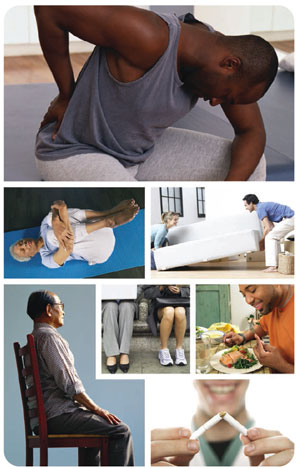 If you have lower back pain, you are not alone! Nearly everyone at some point has back pain that interferes with work, routine daily activities or recreation. Americans spend at least $50 billion each year on low back pain, the most common cause of job-related disability and a leading contributor to missed work.
If you have lower back pain, you are not alone! Nearly everyone at some point has back pain that interferes with work, routine daily activities or recreation. Americans spend at least $50 billion each year on low back pain, the most common cause of job-related disability and a leading contributor to missed work.
Acute or short-term low back pain generally lasts from a few days to a few weeks. Most acute back pain is mechanical in nature — the result of injury to the lower back or a disorder such as arthritis. Symptoms may range from muscle ache to shooting or stabbing pain, limited flexibility and/or range of motion or an inability to stand straight. Chronic back pain is pain that persists for more than 3 months. It is often progressive and the cause can be difficult to determine.
As people age, bone strength and muscle elasticity and tone tend to decrease. The discs begin to lose fluid and flexibility, which decreases their ability to cushion the vertebrae.
Pain can occur when, for example, someone lifts something too heavy or overstretches, causing a sprain, strain, or spasm in one of the muscles or ligaments in the back. If the spine becomes overly strained or compressed, a disc may rupture or bulge outward. Back pain occurs most often between ages 30 and 50, due in part to the aging process but also as a result of sedentary life styles with too little exercise. The risk of experiencing low back pain from disc disease or spinal degeneration increases with age.
A thorough medical history and physical exam can usually identify any dangerous conditions or fam-ily history that may be associated with the pain. Your Orthopaedic Clinic professional will examine the back and conduct neurologic tests to determine the cause of pain and appropriate treatment. X-rays are usually not needed to as-sess new or acute back pain. MRIs are sometimes needed if symptoms don’t improve or you have evidence of pinched nerves in the low back.
Most low back pain can be treated without surgery. Treatment involves using pain medications, anti-inflammatories to reduce in-flammation, and restoring proper function and strength to the back with a physical therapy program. If these non-surgical treatments are not effective, your orthopedic surgeon may consider surgery as an option. The Orthopaedic Clinic is the only ortho clinic in the area with fellowship trained spine surgeons.
Quick tips to a healthier back:
- Stretching
- Good posture
- Wear comfortable, low-heeled shoes.
- Lift with your knees and legs, not your back
- Proper nutrition and healthy diet
- Avoid tobacco
The professionals at The Orthopaedic Clinic have years of experience in treating all types of back problems and have a dedicated spine clinic. If you are suffering from back pain, come see us today for a consultation!
